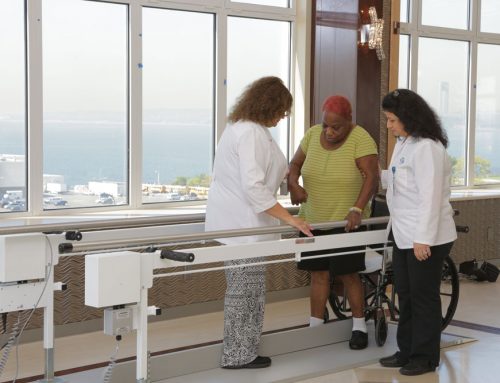People with diabetes tend to be at greater risk of infection and therefore require special monitoring and care. That’s because of their impaired vascular circulation. It therefore becomes harder to fight off infections such as ear, nose, and throat infections. Diabetes sufferers often present with all sorts of other infections, such as yeast infections, influenza, pneumonia, and foot infections.
Brooklyn-based Haym Salomon Home for Nursing & Rehabilitation’s teams of nurses and doctors are on hand 24/7 to offer top quality diabetic care and advice. We provide diabetes care, podiatry and foot care, tailored nutrition programs, restorative therapies as well as kidney failure treatment. We maintain the highest standards of hygiene and do everything possible to reduce the risk of infection.
Good diabetes care is crucial to minimize the risk of infection and fight off infections when they occur. What follows is a general outline for information purposes only. If you or a loved one has diabetes, be sure to get personally relevant advice and information from your doctor.
Let’s take a look at some frequently asked questions about diabetes and the risk of infection.

Risk Of Infection: Why Do Diabetics Have Weakened Immune Systems?
Diabetes is related to high blood sugar levels and implies a weakened immune system. Without a healthy immune system your body’s white blood cells are less able to control infections.
Your immune system is what keeps infections at bay. People with diabetes often have a build-up of plaque in their arteries. This makes it harder for white blood cells to move around the body and kill dangerous microorganisms in infected areas.
Diabetics require special dietary advice and care to help reduce the risk of infection. If infected areas receive a poor blood supply due to plaque build-up and a weakened immune system, recovery from infection takes longer.
Also, preventive measures such as immunization against certain diseases are a wise precaution if you are diabetic.
Why are infections hard to treat in diabetics?
Wound care is a particularly important aspect of diabetic care. That’s because wounds usually take much longer to heal in diabetics than in people with healthy immune systems. A combination of a healthy diet, physical therapy and massage can help reduce the risk of infection.
High blood sugar diabetes can also lead to nerve damage, which causes problems with sensation, particularly in the feet. This sometimes means that injuries go unnoticed, which is dangerous as untreated injuries can lead to infection. Some types of nerve damage can also lead to cracked skin – a convenient entry point for infection.
Foot ulcers are very common in diabetics because poor blood circulation means the infected area is difficult to reach. The lack of healing nutrients able to reach infected areas makes patients more vulnerable to fungal and other infections.
Contact us or walk in if you would like to find out more about nursing care and restorative therapy services. We are here to answer all your questions and concerns. Let us know how we could help you with rehab and nursing care for you or your loved one.
This content comprises informative and educational resources only and can not be considered as a substitute for professional health or medical guidance. Reliance on any information provided in this article is solely at your own risk. If you have any inquiries or apprehensions about your medical condition or health goals, talk with a licensed physician or healthcare provider.






Leave A Comment